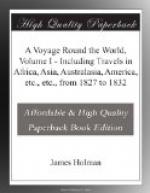When they have arrived at healthy boyhood, they first come to Sierra Leone in the capacity of apprentices to the old hands, who are considered as headmen or masters: these headmen, according to their influence, or station in their own country, have a proportionate number of apprentices attached to them, fluctuating from five to twenty, to teach them what they call “White man’s fashion.” The profit of the labour of the youths is always received by the headmen, who returns them a small portion of it. When an apprentice goes back to his own country, after his first trip, he is considered to have passed through the period of initiation, and when next he visits Sierra Leone, he comes upon his own account. The amount of the gains of this visit (a great part of which consists of what they have been able to steal) is delivered up to the elders of his family, who select and purchase a wife for him. A short time is now spent in marriage festivities with the respective relatives of the parties, and then a fresh venture to Sierra Leone is undertaken, on which occasion he leaves his wife with her relations. The proceeds of the third visit are dedicated to the building of a hut, and the purchase of another wife. But he does not remain long at home, before he prepares to set out again for the purpose of making fresh accessions to his wealth, so that he may increase his household up to the desired point where his own personal labour will be rendered unnecessary to his support. In this way he continues to visit Sierra Leone, accumulate property, and purchase wives, the general number of which varies from six to ten, until he has secured the requisite domestic establishment, when he “sits down” (as they call it) for the remainder of his life, in what he considers affluence and happiness. The process of wife-buying is remarkably curious. For the first wife they pay two bullocks, two brass kettles, one piece of blue baft, and one iron bar; but the terms upon which they obtain the rest, depends entirely upon the agreement they make with the parents of the brides. A convenient condition is attached to the marriage articles, which secures the husband against any risk of being disappointed by the bargain. If, after marriage, he discovers in the lady any imperfection, or qualities that falsify the account given of her previously by her parents, he is at liberty to turn her away in disgrace, and the rejected bride is for ever after looked upon as an abandoned character. In a very ancient history of Ireland, it is stated,




